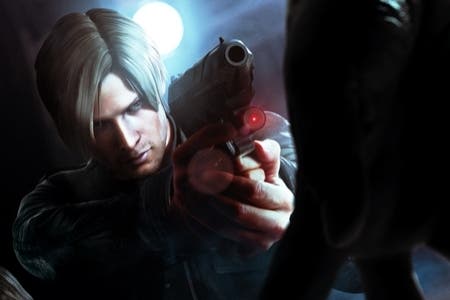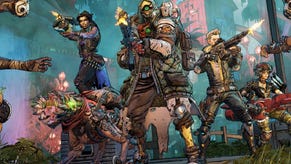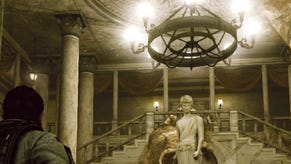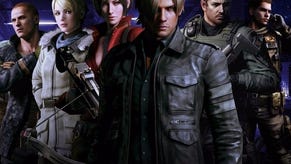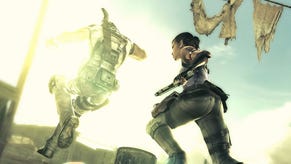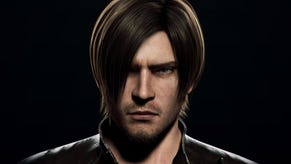Resident Evil 6 review
An old kind of evil.
"I can't believe this is happening again. It's just like Raccoon."
Leon S. Kennedy's reference to the first town overrun by zombies in Capcom's long-running survival horror series is pregnant with meaning. At face value, it's the eye-rolling incredulity of a zombie-thwacking protagonist thrown into the familiar peril of a sequel: 'This again? Really?' But as Kennedy and his new partner-in-uniform Helena Harper creep their way through an abandoned American university, its creaking halls resounding with the thunderclaps and rude flashes of a nighttime electrical storm, at times it does feel just like Raccoon.
Rabid dogs smash through glass panes while bug-eyed cadavers turn their heads to glare back at you over rotten shoulders, just as if you've wandered back into Spencer Mansion's woodworm-infested corridors. The fixed camera angles and boat-like character steering of the series' formative days have been consigned to history. Nevertheless, the scenery in these early stages of Resident Evil 6 - from the set dressing to the instant deaths to the quicktime events - is pure Shinji Mikami - even if the gifted designer is long gone.
So, in this moment, Kennedy is also acting as Capcom's mouthpiece, whispering reassurances in our ears. For all its respectable sales, Resident Evil 5 found few lovers. And with the series lacking a visionary to replace Mikami, the comment is part statement of intent, part hopeful reassurance from the Japanese developer: We've still got it. It's just like Raccoon.
And God, the effort they've gone to. Four expansive, intertwining campaigns, each divided into five 60-odd minute-long chapters. A return of the series' best-known protagonists, paired off into co-op-facilitating duos. Scores of different zombie types to stomp and dismember; hundreds of collectibles to gather; thousands of skill points to harvest and funnel into an array of performance-enhancing upgrades - the game's generous stuffing is packed tight.
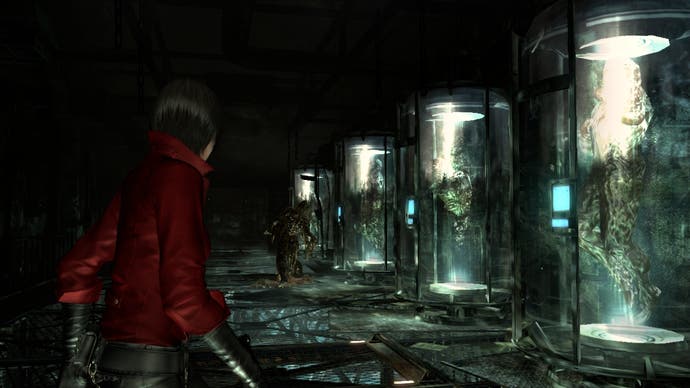
There's even a seasoning of fashionable multiplayer invention layered on top, the game momentarily pairing players of different campaigns at key points where their stories cross paths. Then, complete a campaign and you unlock a Left 4 Dead-style Agent Hunt mode, in which you can dive into another player's game and hunt them as a zombie.
The storyline, in bulk at least, feels like four triple-A games tacked together, each with its own distinct interface, each with its own flavour, each riffing on a different aspect of Resident Evil's past. Over its course you fly planes, dodge trains and drive automobiles. This is Resident Evil on a seemingly infinite budget, no idea too expensive, no whim beyond scope. The swollen statistics even spill out of the game and into its creation, which called upon over 600 internal and external staff to deliver it ahead of schedule.
It's a giant, cumbersome beast - possibly the largest and longest action game in history - and its heft dares you to talk about anything other than the sheer effort that went into its construction. It's an Egyptian pyramid of a game (no doubt with the tired spirits of its builders buried inside).
And yet when you get down to it, Resident Evil 6 is not much like Raccoon at all.
Leon's campaign is the closest we get to the series' survival horror roots - albeit funnelled through Uncharted's linear corridor structure and set-piecing du jour. His story sees you bludgeoning your way through subways, scrambling over wire fences and limping through burning streets. The game is still about the horror of managing a scarcity of resources - never use a bullet when a sharp elbow will do - but gone is the suitcase-rearranging item management (even if the staccato rhythms of diving in and out of menus to prepare each shot remain, thanks to the fiddly gun selection). Now you can carry as much as you like and with a breakable crate every ten steps - not to mention item drops from decapitated zombies - you're rarely at a loss for ammunition.
"It's a giant, cumbersome beast... an Egyptian pyramid of a game."
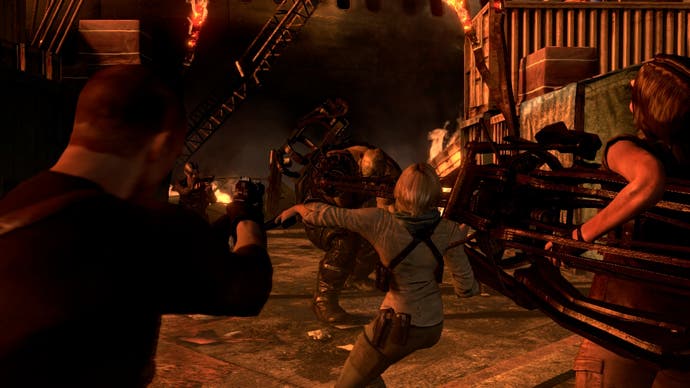
The camera hovers over your shoulder and shooting demands precision. Aim down the sights and the tight zoom affords accuracy at the cost of peripheral vision: a delicate trade-off. Capcom generously includes a variety of options for customising the feel of the game; for those who find the camera twitchy and the objective point markers invasive, the pace can be slowed, laser targeting introduced and the extraneous head-up display switched off to create a more orthodox experience.
Away from tradition, your health bar is divided into notches and you're knocked to the ground each time a section is emptied, where you can slide around on your back shooting upwards at your attacker. Find your health bar emptied completely and you must either wait for your teammate to revive you, or blearily retire beneath a nearby desk or into a cranny and pray no monster notices as you wait 30 seconds for your health bar to repair.
Resident Evil's herb system, in which pot plants can be scavenged and combined to create restorative pills, has been overhauled and streamlined; you can gulp down pills with taps of a button during play. At the close of each chapter you're awarded an array of medals for your various in-game accomplishments, while any skill points you've accrued can be spent on unlocking and equipping up to three abilities, improving your melee strength, for example, or reducing the time it takes to reload a weapon.
While the controls are consistent across all four of the campaigns, it's during Leon's story that the game comes closest to the series' zenith, Resident Evil 4, requiring the odd moment of crowd control as a herd of zombies rounds on you. But when you peel back the exquisite detail and set dressing, the level design offers little more than a long winding ghost train of a corridor, robbing these flashes of their potency: you can always just sprint to the next checkpoint. There's rarely the space to become truly overwhelmed and the game lacks the width for exploration off the beaten track.
"Leon's story is the strongest of the initial set. Chris Redfield's campaign is categorically the worst, all sense of horror and pacing removed to leave a second-rate, third-person sprint interrupted by endless shootouts"
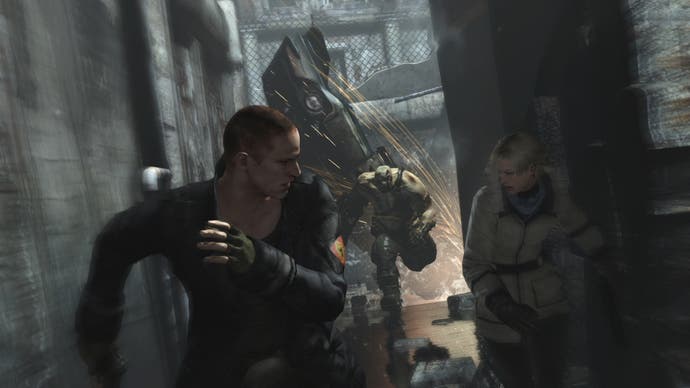
This problem is compounded by the zombies themselves - known here as the J'avo. Where the fourth game induces panic through a mob of unpredictability - all sporadic bursts of speed and lunging sidestep dodges - the J'avo do little to distinguish themselves from the cultural throng of undead, while their AI behaviour demands little in the way of strategy. There may be the occasional sprouting - a tentacle through the neck here, a maggot-like arm protrusion there - but the horror is over-familiar. There's none of the hick fear engendered by the red-eye glare and pitchforks of Los Ganados. Even Resident Evil 5's African monsters carried an edge of accidental racism. The J'avo are merely offensively bland.
Leon's story is the strongest of the initial set. Chris Redfield's campaign is categorically the worst, all sense of horror and pacing removed (a violin glissando cannot accentuate terror if there's no terror there in the first place) to leave a second-rate, third-person sprint interrupted by endless shootouts with gun-toting grunts and idiotic cut-scene dialogue. It's here that you find most of the game's set-piece boss fights - both with hulking mutated beings and attack choppers - but despite Redfield's newfound ability to duck and strafe, this quarter of the game is a slog.
Jake Muller's campaign is a little improved, choosing Resident Evil 3 for its inspiration as you flee an Ustanak that bears more than a passing resemblance to Nemesis, your pursuer in that game. But it rarely delights, with awkward boss encounters that outstay their welcome and tedious short-hop journeys to link those dramas. At least Sherry Birkin's character is a welcome addition here, her vulnerability in co-op adding a much-needed change in tone to a wider story that's as dull as it is one-note.
"A tribute act to Resident Evil, this generous homage nevertheless lacks authenticity, warmth and bite."
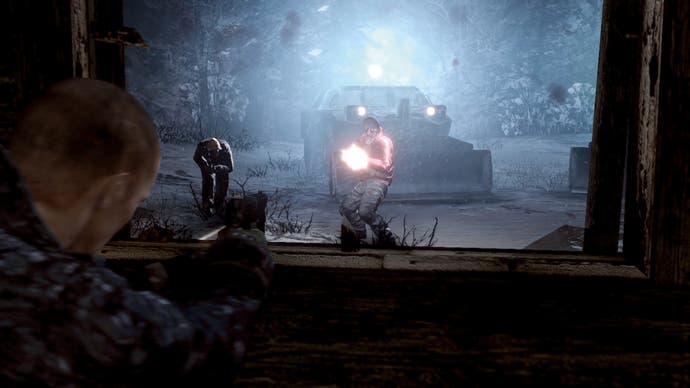
But it's Ada Wong's campaign - unlocked only when you have completed the first three - that brings the most diverse flavour. Hookshot in hand, antagonist Wong's stealth creep through her chapters is punctuated by a series of ingenious puzzles that offer reminders of just how much the series has moved away from its roots in recent years. Her dry quips are a welcome change after Kennedy's sulky observations, Redfield's meathead tantrums and Muller's swagger and petulance, while it's refreshing to play without an accomplice in tow to open each door or hoist you onto every ledge. That Wong's campaign is tucked away at the tail end of the game is a shame, as it counterbalances the sub-mediocrity of Redfield's missions and the arch-blandness of Jake's.
Just like Raccoon, then? A tribute act to Resident Evil, this generous homage nevertheless lacks authenticity, warmth and bite. It's inspired by rather than inspired - the damning truth that haunts every impersonator.
The game represents a tremendous amount of effort and investment and, for those impressed by such things, Resident Evil 6 may delight. But all the effort in the world won't make up for a lack of vision. This game is blind to imagination and focus. Capcom's uncertainty about the series' identity post-Mikami (and post-Uncharted) is hardcoded into its structure: four campaigns offering different, flawed expressions of that potential. And the inevitable price for this wavering is a lack of coherence. Resident Evil 6 is an unwieldy tribute to the series' past, an uneven expression of its present and an unwelcome indication of its future.
